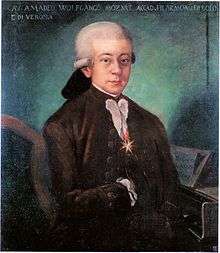Die Schuldigkeit des ersten Gebots
| Die Schuldigkeit des ersten Gebots | |
|---|---|
| Opera by W. A. Mozart | |
 The composer in 1777, by an unknown painter | |
| Description | Geistliches Singspiel |
| Language | German |
| Premiere |
12 March 1767 Knights' Hall, Salzburg Residenz |
Die Schuldigkeit des ersten Gebots (complete title in historical spelling: Die Schuldigkeit Des ersten und fürnehmsten Gebotes; The Obligation of the First and Foremost Commandment), K. 35, is a sacred musical play (geistliches Singspiel) composed by Wolfgang Amadeus Mozart in 1767 when he was 11 years old. It is Mozart's first opera or, more specifically, sacred drama, as is suggested by the name. The libretto is now attributed to Ignatz Anton von Weiser, although Johann Adam Wieland or Jakob Anton Marianus Wimmer had been suggested earlier. (The title page of the libretto ascribes it only to "J.A.W.".)[1] Only the first part of the opera was composed by Mozart; the second and third parts were contributed by Michael Haydn and Anton Cajetan Adlgasser respectively. However, these other two parts have not survived.[2] Part 1 of the opera was first performed on March 12, 1767, in the Knight's Hall of the Palace of the Archbishop, the Salzburg Residenz. Part 2 was performed on March 19, and part 3 on March 26.[1]
Background and performance history
Mozart composed the work at age 11 with the help of his two teachers, Michael Haydn and Anton Cajetan Adlgasser. In Salzburg, dividing up a sacred singspiel between other composers was common. The libretto was written by Ignatz Anton von Weiser even though it was said that Johann Adam Wieland suggested the idea first and his name is written on the libretto. Mozart composed only the first part of the opera, and the others composed "part two" and "part three." However, these other two parts have not survived.[3] The performances were predominantly in Salzburg in St. Peter's, in Cathedrals, on the Nonnberg, and in Residenz. The opera includes many recitatives for all of the characters, and each character sings one to three arias. The main characters of the opera are the two tenors; Christgeist and Weltgeist, and the two sopranos; Barmherzigkeit and Gerechtigkeit. The opera does not have a chorus.
Part I of the opera was first performed on 12 March 1767 in the Knight's Hall of the Palace of the Archbishop, Salzburg. Part II was performed on 19 March, and Part III on 26 March.[1]
Roles
| Role | Voice type | Premiere cast, 12 March 1767 (Conductor: – ) |
|---|---|---|
| Gerechtigkeit, divine justice | coloratura soprano | Maria Anna Braunhofer |
| Christgeist, spirit of Christianity | tenor | Anton Franz Spitzeder |
| Barmherzigkeit, divine mercy | soprano | Maria Magdalena Lipp |
| Ein lauer und hinnach eifriger Christ, a half-hearted but later zealous Christian |
tenor | Joseph Meissner |
| Weltgeist, worldliness | soprano | Maria Anna Fesemayer |
Musical numbers
- Sinfonia Allegro
- Recitativo: Die löblich' und gerechte Bitte
- No. 1 Aria: Mit Jammer muß ich schauen
- Recitativo: So viele Seelen Fall
- No. 2: Ein ergrimmter Löwe brüllet
- Recitativo: Was glaubst du?
- No. 3: Erwache, fauler Knecht
- Recitativo: Er reget sich
- Recitativo: Wie, wer erwecket mich?
- No. 4: Hat der Schöpfer dieses Leben
- Recitativo: Daß Träume Träume sind
- No. 5: Jener Donnerworte Kraft
- Recitativo: Ist dieses, o so zweifle nimmermehr
- No. 6: Schildre einen Philosophen
- Recitativo: Wen hör' ich nun hier in der Nähe
- No. 7: Manches Übel
- Recitativo: Er halt mich einem Kranken gleich
- Recitativo: Hast du nunmehr erfahren
- No. 8 Terzetto: Laßt mir eurer Gnade Schein
See also
References
- 1 2 3 OperaGlass summary at stanford.edu, accessed on October 6, 2007
- ↑ WienMozart2006 page on Die Schuldigkeit des ersten Gebots, accessed on October 6, 2007
- ↑ WienMozart2006 page on Die Schuldigkeit des ersten Gebots, accessed on October 6, 2007
External links
- Die Schuldigkeit des ersten Gebots: Score and critical report (German) in the Neue Mozart-Ausgabe
- (German) Libretto
